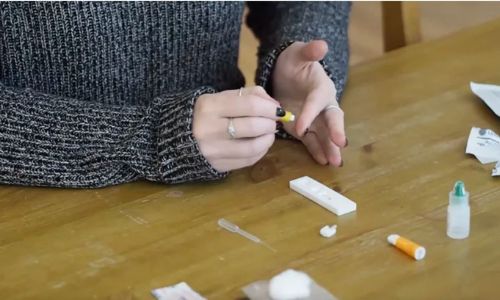Children of the 90s, a health study based at the University of Bristol, has today published results from a study testing almost 5,000 participants for COVID-19 antibodies. 4.3% reported a positive result, of which a quarter were asymptomatic and did not report any symptoms in previous questionnaires.
Whilst a positive result does not indicate immunity to the virus, the results are an important step in helping scientists to answer vital questions about who is affected, how it spreads through the community, and possible immune responses.
Key findings were:
4.3% of participants reported a positive result on their antibody test (206 participants)
Almost twice as many young people reported a COVID-19 infection than those of their parents’ generation – 5.9 % of young people & 3.1 % of their parents age reported a positive antibody response
Of those who tested positive, around a quarter were asymptomatic
Professor Nic Timpson, Children of the 90s’ Principal Investigator said: “We want to understand how many people in our study have had a COVID-19 infection, especially those who had an infection without even knowing it or with only mild symptoms. With decades of valuable health data to provide background to this pandemic, longitudinal research is key to learning more about COVID-19.”
The research will now form part of a national collaboration with the UK Coronavirus Immunology Consortium (UK-CIC) which is led by Professor Paul Moss at the University of Birmingham. 300 Children of the 90s participants are being invited to take part in the ongoing study over the next 12 months, which will offer a unique insight into how people respond to the virus and the condition known as Long Covid.
“The immune system is critical to determining the outcome of all infections and indeed understanding so many of the unknowns about the pandemic” Professor Paul Moss, University of Birmingham.
Professor Timpson continued: “We hope to learn more about how the immune system responds and how long it takes for people to fully recover from COVID-19. As one of only two longitudinal studies invited to take part, our data is particularly important as we study young people who may be entirely asymptomatic but carrying the virus.
Participants can get back in touch to take part in future studies even if they haven’t done anything for a while. Simply send your name and date of birth to info@childrenofthe90s.ac.uk or text 07772 909090 to check if you are eligible.
Further information
Key statistics
In total, 206 (4.3%) of participants reported a positive result in the antibody test. This breaks down as follows:
Positive antibody tests
Total
Total participants
206 (4.3%)
Original Fathers
20 (2.7%)
Original Mothers
63 (3.2%)
Young people – male (age 28-19)
96 (6.2%)
Young people – female (age 28-29)
27 (5.2%)
About Children of the 90s
Based at the University of Bristol, Children of the 90s, also known as the Avon Longitudinal Study of Parents and Children (ALSPAC), is a long-term health-research project that enrolled more than 14,000 pregnant women in 1991 and 1992. It has been following the health and development of the parents and their children in detail ever since and is currently recruiting the children and the siblings of the original children into the study. It receives core funding from the Medical Research Council, the Wellcome Trust and the University of Bristol. Find out more at www.childrenofthe90s.ac.uk.
About the UK Coronavirus Immunology Consortium
The UK Coronavirus Immunology Consortium brings together UK immunology centres of excellence to research how the immune system interacts with SARS-CoV-2 to help us develop better diagnostics, treatments and vaccines against COVID-19.
UK-CIC is jointly funded by UK Research and Innovation (UKRI) and the National Institute for Health Research (NIHR)
Website: www.ukcic.org

